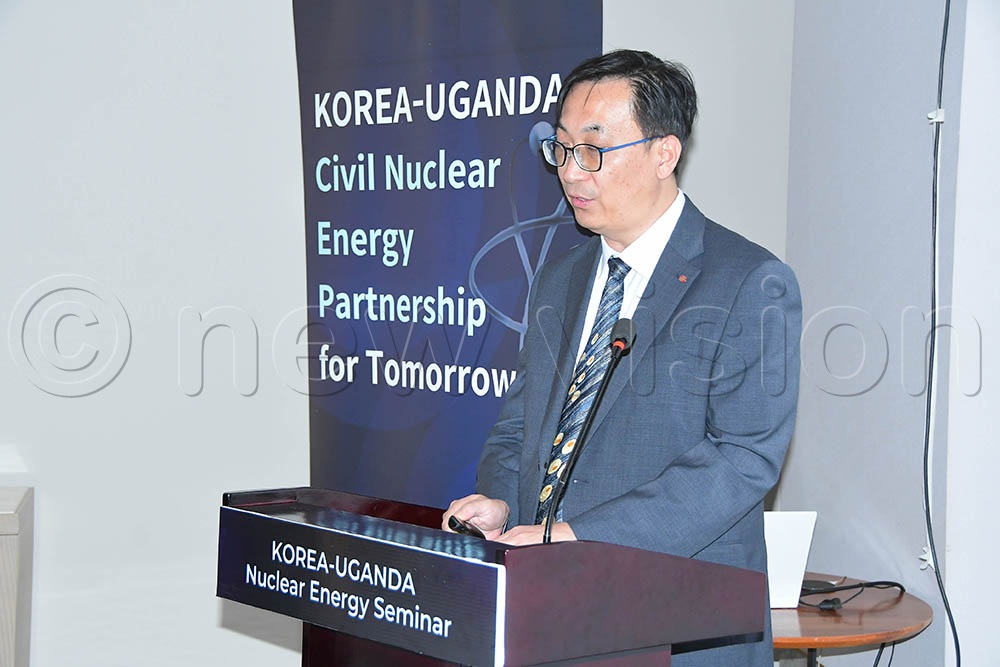Uganda looks to nuclear energy development to achieve over 50,000MW by 2040
South Korean Ambassador to Uganda Park Sung-Soo emphasised his country’s unwavering support for Uganda’s nuclear ambitions during the event titled: Korea-Uganda Nuclear Energy Partnership for Tomorrow.
Some of the participants at the Korea - Uganda Civil Nuclear Energy Workshop at Four Point by Sheraton Hotel in Kampala. (Credit: Silvano Kibuuka)
KAMPALA - Uganda is accelerating its push to harness nuclear energy as a cornerstone of its ambitious goal to generate over 50,000 megawatts (MW) of electricity by 2040.
During a workshop, co-hosted by the South Korean Embassy in Uganda and Ugandan officials, the country's collaboration with South Korea to advance its nuclear aspirations was highlighted.
South Korean Ambassador to Uganda Park Sung-Soo emphasised his country’s unwavering support for Uganda’s nuclear ambitions during the event titled: Korea-Uganda Nuclear Energy Partnership for Tomorrow.
“This timely project will strengthen ties between our nations, and I commend Uganda for leveraging Korea’s technological expertise,” he said.
The workshop, held at the Four Points by Sheraton Hotel last week, brought together stakeholders from government, academia and industry to discuss progress on Uganda’s nuclear roadmap.
Energy state minister Okaasai Opolot acknowledged the rapid strides made since the partnership began.
“We’re moving faster than projected. Even sceptics are now witnessing the project’s tangible progress,” he said.
The Government aims to commission its first nuclear power plant by 2033, with plans to expand capacity to 24,000 MW from nuclear sources alone by 2040.
Denis Tusiime, a senior nuclear officer at the energy ministry said: “The first plant will generate at least 2,080 MW by 2033, with additional reactors to follow. Our energy policy targets 52,480 MW total capacity by 2040, positioning nuclear as a critical pillar.” 
Senior manager for overseas NPP project office for Korea Hydro and Nuclear Power Company Ltd Jong Yun Kim deliberating at the workshop at Four Point by Sheraton over the progress of Nuclear energy in Uganda. (Credit: Silvano Kibuuka)
The ministry has identified six potential sites, led by Buyende, which is slated for an 8,400 MW plant under a 26-month feasibility study launched in May 2025.
The study, part of a landmark agreement between the energy ministry and South Korea’s KHNP, is a key step toward deploying six pressurised water reactors by 2040.
Other prospective sites include Nakasongola (7,200 MW), Kiruhura (4,800 MW), Lamwo (4,000 MW), and smaller installations in the districts of Sembabule and Buwhezu.
Tusiime also highlighted nuclear energy’s broader societal benefits beyond electricity, citing applications in healthcare, agriculture, and industrial growth.
“While nuclear began with military uses, its potential for medical advancements, from cancer treatment to diagnostics, alongside energy security, makes it indispensable for Uganda’s development,” he said.
Kevin Mukyala, Uganda’s radiation protection officer at the Atomic Energy Council (AEC), stressed the importance of rigorous safety standards.
“We’re modernising our legal framework to align with global best practices, including lessons from past incidents like Fukushima,” he said.
Collaboration with South Korea will focus on staff training, emergency preparedness, licensing protocols and environmental safeguards.
The workshop also marked progress on Uganda’s “Vision 2040,” aiming to transform the nation into a middle-income economy.